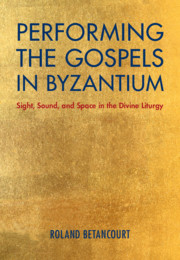Book contents
4 - The Reading of the Lectionary
Recitation, Inspiration, and Embodiment
from Part II - The Liturgy
Published online by Cambridge University Press: 12 March 2021
Summary
Moving from the specificities of the manuscript itself to the conditions of reading and recitation, this chapter looks at when and how the Gospel lectionary was used in the Divine Liturgy, while also investigating the cultural role and conception that the practice of reading held in the post-iconoclastic Byzantine world. This presents us with a survey of not only liturgical practices, but also how reading was understood as being a process of divine inspiration, akin to being possessed, which allowed the speakers in the text to be embodied through the reader. The chapter surveys not only the classical heritage of these ideas, but also contemporaneous descriptions of chanters and recitation competitions held in Constantinople, which allow us to understand the cultural importance and milieu under which these illuminated Gospel lectionaries were produced and used.
Information
- Type
- Chapter
- Information
- Performing the Gospels in ByzantiumSight, Sound, and Space in the Divine Liturgy, pp. 168 - 191Publisher: Cambridge University PressPrint publication year: 2021
